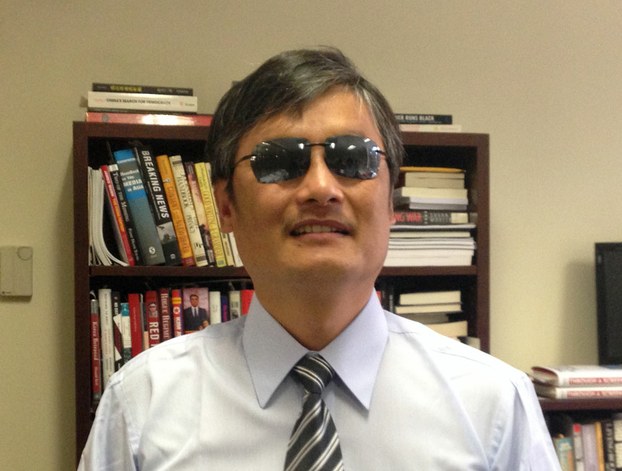Family planning abuses continue in China's Shandong province
| Publisher | Radio Free Asia |
| Publication Date | 2 September 2015 |
| Cite as | Radio Free Asia, Family planning abuses continue in China's Shandong province, 2 September 2015, available at: http://www.refworld.org/docid/561b978415.html [accessed 27 June 2017] |
| Disclaimer | This is not a UNHCR publication. UNHCR is not responsible for, nor does it necessarily endorse, its content. Any views expressed are solely those of the author or publisher and do not necessarily reflect those of UNHCR, the United Nations or its Member States. |
2015-09-02
 Chen Guangcheng at RFA in Washington, June 25, 2014. RFA
Chen Guangcheng at RFA in Washington, June 25, 2014. RFA
More than three years after blind Chinese rights activist Chen Guangcheng arrived in the United States after a daring escape from house arrest at his hometown in the eastern province of Shandong, the abuse he highlighted by family planning officials still continues.
A resident of Yishui county near Chen's hometown of Linyi city, Li Fudong, said family planning officials from Yishui's Daotuo township had beaten two of his family members after accusing him and his wife of an "excess birth" last month.
Li said his second wife had given birth to a son after marrying him, although they had two children between them from previous relationships, leading officials to fine them 170,000 yuan (U.S. $26,750) for an "excess birth."
When the couple fled their home village after they were unable to pay, officials detained Li's mother-in-law Chen Fanrong and beat up his father-in-law Gong Peilong, in a bid to put pressure on them to hand over the money.
"Officials from the township government took my mother-in-law away and held her for six days," Li said. "After she came back, they took my father-in-law away and kept my mother-in-law under surveillance, then beat up my father-in-law."
"They made my mother-in-law kneel down and demanded the money," he said.
"At that time, they demanded 45,000 yuan (U.S. $7,100), and the next day, they beat up my father-in-law; on Aug. 13, they beat [him] unconscious," Li said.
"My mother-in-law was admitted to hospital for a week after that."
According to Li Fudong, Chen was kept in unbearably high temperatures when in illegal detention, deprived of sleep, and denied her regular blood pressure medication.
And when Gong reported the beating to the police, they said it "was inconvenient" to deal with it as an attack because it was carried out by the government, Li added.
Li named the officials who beat up his father-in-law as Niu Qingyou and Kong Deqiang, from the village and township government.
"Most of the beating was done by Niu Qingyou," he said.
'Excess birth'
Li said he has a daughter by a previous marriage who has remained with her mother, while his second wife had a son who remained with his father after the parents broke up.
"I got to thinking that I have no kid around, since my divorce many years ago," he said, adding that the authorities have since dropped their demand to 170,000 yuan in fines.
"I told them that we don't even have a place to live, and we can't even afford to eat right now," he said. "I told them I'd go and find manual labor and give them the money when I'd earned it."
Li Qingzheng, an official who answered the phone at the Daotuo township government family planning department confirmed that Li Fudong had been found to have an excess birth.
But he denied the attack on Chen and Gong.
"No, no, no," he said. "Look at us – is that likely?"
Blind rights lawyer
In the first significant easing of the one-child policy in nearly 30 years, Beijing announced at the end of 2013 that couples will be allowed to have two children if one of the parents is an only child.
Previously, most parents were restricted to having one child, although the political and financial elite were able to afford the financial penalties, and often have larger families.
Urban couples were permitted a second child if both parents do not have siblings, while rural couples were allowed to have two children if their first-born was a girl.
Chen Guangcheng, a self-taught lawyer who exposed forced abortions under China's one-child policy and defended the rights of ordinary people, has been living and studying in the United States since arriving in New York in May 2012, after a diplomatic standoff between Washington and Beijing.
After 18 months of house arrest in Dongshigu village, Chen Guangcheng outwitted his guards and made his way to the U.S. Embassy in Beijing, where Chinese and American officials eventually struck a deal allowing him and his family to go to the U.S. to study.
During the high-level diplomacy surrounding Chen Guangcheng's flight to asylum in the United States, China had pledged to investigate and prosecute those responsible for the abuse of his family members, who were routinely harassed and beaten by thugs they believed were sent by local officials.
But Chen Guangcheng says such an investigation has never taken place.
Reported by Qiao Long for RFA's Mandarin Service. Translated and written in English by Luisetta Mudie.
Link to original story on RFA website
